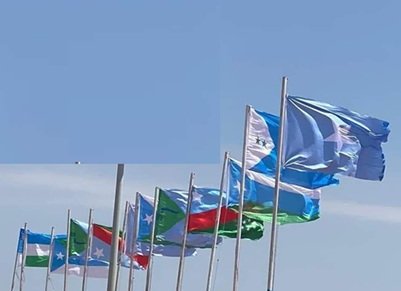By Abdirahman Dahir Osman,
Former Minister of Education of FGS and an education specialist
Somalia’s federal model was adopted to rebuild trust, decentralize power, and promote inclusive political participation in a post-conflict society. It envisioned collaborative framework between the central government and constituent federal member states, each composed of two or more of the 18 regions that existed prior to the civil war. The goal was to empower regional voices while maintaining national unity. Yet today, Somalia’s federalism appears less a roadmap for unity and more a terrain of fragmentation. Flags of federal states often overshadow the national flag; subnational constitutions attract more attention than the Somali charter; and citizens increasingly identify by region or clan rather than by nation.
This raises a fundamental question: Is the problem rooted in the federal system itself, or in the leadership that operates within it?
This article offers a brief analysis of whether the underlying issues stem from institutional design or from the individuals charged with carrying it forward.
Federalism, by definition, distributes power between a central authority and regional governments. In Somalia, this concept was underpinned by aspirations for:
1) Resource-sharing and equitable development
2) Delegated authority for broader political representation and
3) Stability and service delivery through localized governance
Although Somalia’s federal system holds significant promise, its potential has been repeatedly undermined by incompetent, corrupt, and self-serving leaders both at the federal and state levels, who operate with little regard for the rule of law. Instead of implementing the core principles of federalism and promoting inclusive governance, the political elite have exploited the system to advance personal and clan-based interests. This manipulation of power dynamics has not only deepened divisions but also weakened national cohesion, ultimately obstructing meaningful progress and long-term stability.
Beyond mere empty promises, the erosion of trust in Somali leadership at both federal and state levels—arises from pervasive incompetence, lack of vision, and misplaced priorities, causing many Somalis to lose faith in their leaders.
This decline signals a weakening of the state’s foundational pillars, as diminishing public participation and waning belief in leadership foster governance failures that deepen divisions, fracture national unity, and undermine legitimacy. As citizenship erodes, the very legitimacy of the Somali state is at risk, endangering its stability and future coherence.
Moreover, the creeping dominance of clan identity has overshadowed the principles of national cooperation, with clan loyalties shaping political boundaries, appointments and governance decisions, thereby fueling division rather than unity. This dynamic has intensified competition over resources and political control, exacerbating tensions and leaving unresolved principal issues, such as Mogadishu, Somalia’s capital—as persistent breaking point. Additionally, federal member states frequently act as autonomous entities, undermining federal authority and exposing the system’s underlying weaknesses. These issues reflect a profound lack of institutional maturity and leadership integrity necessary to fulfill the promise of federalism in fostering stability and unity.
Another key issue is that Somalia’s fragmented approach to federalism has significantly transformed its national identity. Instead of a citizenry unified by allegiance to the Somali state, growing numbers align with subnational symbols and loyalties. This deterioration of national identity is not theoretical, it manifests in practical governance failures, weakened public trust, and increasing regional isolation. As citizenship erodes, so too does the legitimacy of the Somali state.
While am not advocating for federalism, I recognize that it has been adopted as Somalia’s framework of governance and it is crucial to critically examine its implementation. It is imperative to ask whether the foundations of federalism are culturally and ethically sound, if the process has genuinely respected the will and welfare of regional populations, and whether it currently promotes development, justice, and peace. Equally, we must confront whether federalism has devolved into a tool for power hoarding, manipulation, and exclusion. Beyond the system itself, other determinants—particularly leadership, which I believe lies at the heart of Somalia’s federal challenges must be thoroughly addressed. Without principled, inclusive, and visionary leadership, no system can succeed however well designed.
Federalism in Somalia was not doomed from the start it was derailed by leadership failure, institutional fragility, and clan-driven politics. Yet its promise can still be redeemed. Through courageous leadership, structural reform, and a renewed commitment to unity and equity, Somalia can reclaim federalism as a viable path toward inclusive governance, national stability, and dignified statehood. Therefore, reform efforts should therefore focus on strengthening integrity and transparency across both federal and state institutions to ensure meaningful and sustainable progress.
Cabdiraxmaan Daahir Cusmaan
Email: buulaay1@gmail.com
————–
Abdirahman is a former Minister of Education of the Federal Government of Somalia and an education specialist.


Leave a Reply